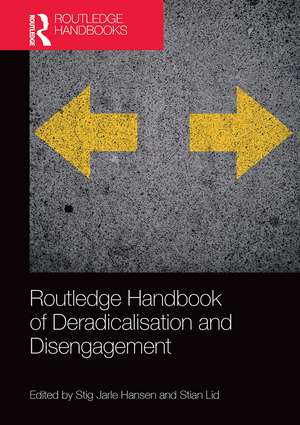Routledge Handbook of Deradicalisation and Disengagement
Editat de Stig Jarle Hansen, Stian Liden Limba Engleză Paperback – 29 aug 2022
Radicalisation and violent extremism are major global challenges, and as new and violent extremist groups and environments emerge, there is an increasing need for knowledge about how individuals physically exit these movements and how to change their mindset. Historically, much of the focus on these topics has been highly securitised and militarised; by contrast, this volume explores the need for more community-based and ‘soft’ approaches. The handbook includes discussions from both right-wing/left-wing political and religiously inspired deradicalisation processes.
The handbook is organised into three parts:
1 definitions, backgrounds and theories;
2 actors;
3 regional case studies.
This handbook will be of much interest to students, researchers, scholars and professionals of deradicalisation, counterterrorism, political violence, political extremism, security studies and international relations in general.
| Toate formatele și edițiile | Preț | Express |
|---|---|---|
| Paperback (1) | 412.41 lei 6-8 săpt. | |
| Taylor & Francis – 29 aug 2022 | 412.41 lei 6-8 săpt. | |
| Hardback (1) | 1215.67 lei 6-8 săpt. | |
| Taylor & Francis – 3 mar 2020 | 1215.67 lei 6-8 săpt. |
Preț: 412.41 lei
Nou
Puncte Express: 619
Preț estimativ în valută:
78.92€ • 81.41$ • 65.85£
78.92€ • 81.41$ • 65.85£
Carte tipărită la comandă
Livrare economică 26 martie-09 aprilie
Preluare comenzi: 021 569.72.76
Specificații
ISBN-13: 9781032400570
ISBN-10: 1032400579
Pagini: 374
Ilustrații: 6
Dimensiuni: 174 x 246 x 23 mm
Greutate: 0.36 kg
Ediția:1
Editura: Taylor & Francis
Colecția Routledge
Locul publicării:Oxford, United Kingdom
ISBN-10: 1032400579
Pagini: 374
Ilustrații: 6
Dimensiuni: 174 x 246 x 23 mm
Greutate: 0.36 kg
Ediția:1
Editura: Taylor & Francis
Colecția Routledge
Locul publicării:Oxford, United Kingdom
Public țintă
Postgraduate, Professional, and UndergraduateCuprins
1. Introduction: Why do we need a handbook on disengagement and deradicalisation? Stig Jarle Hansen and Stian Lid Part I: Definitions, Backgrounds and Theories 2. Terminology and Definitions Daniel Koehler 3. Concepts and practices; a brief history of disengagement and deradicalization Stig Jarle Hansen 4. Exploring the Viability of Phase-Based Models to (De)Radicalization Liesbeth Mann, Lars Nickolson, Allard R. Feddes, Bertjan Doosje, and Fathali M. Moghaddam 5. Psychological approaches to terrorist rehabilitation: Direct and indirect mechanisms of deradicalization David Webber, Marina Chernikova, Erica Molinario, and Arie W. Kruglanski 6. Gender, deradicalization and disengagement Jennifer Philippa Eggert 7. Deradicalization or DDR? The challenges emerging from variations over forms of territorial control Stig Jarle Hansen 8. "Welcome" Home: Deradicalisation of Jihadi Foreign Fighters Arie Perliger Part II: Actors 9. Prison-based Deradicalization: What do we need to determine what works? Jessica Stern and Paige Pascarelli 10. Care and control: local governments’ role in disengagement, deradicalisation and reintegration initiatives Stian Lid 11. When trust is essential: Civil actors’ role in deradicalization and disengagement initiatives Tina Wilchen Christensen 12. Deradicalisation Through Religious Education Rached Ghannouchi 13. United Nations and Counter-Terrorism: Strategy, Structure and Prevention of Violent Extremism Conducive to Terrorism: A Practitioner’s View Hans-Jakob Schindler 14. Preventing Radicalisation and Enhancing Disengagement in the European Union,Christian Kaunert, Sarah Léonard and Ikrom Yakubov 15. African Union initiatives to counter terrorism and develop deradicalisation strategies Anneli Botha Part III: Regional Case Studies 16. Deradicalisation and disengagement in the Benelux: A variety of local approaches Amy-Jane Gielen 17. Desistance and Disengagement Programmes in the Prevent Strand of the UK’s Counter-Terrorism Strategy: A Public Health Analysis Mohamed S. Elshimi 18. Promoting Disengagement from Violent Extremism in Scandinavia: What, Whom, How? Anja Dalgaard-Nielsen and Jakob Ilum 19. De-radicalisation: China’s Panacea for Conflict Resolution in Xinjiang Bhavna Singh 20. Deradicalization and Disengagement: Context, Actors, Strategies and Approaches in South Asia Bahadar Nawab 21. Psycho-social and Islamic Challenge Approaches to in-Prison Treatment of Militant Jihadis Anne Speckhard and Ardian Shajkovci 22. The Politics of Deradicalisation in Israel/Palestine Lihi Ben Shitrit 23. Disengagement and Preventing/Countering Violent Extremism in the Horn of Africa: An Analysis of Contemporary Approaches and Discussion of the Role Disengagement can play in Preventing/Countering Violent Extremism Martine Zeuthen 24. Turning the Page on Extremism: Deradicalization in the North American Context Mubin Shaikh, Hicham Tiflati, Phil Gurski, and Amarnath Amarasingam 25. Deradicalization and Disengagement in Latin America Irina Chindea 26. Conclusion Stig Jarle Hansen and Stian Lid
Notă biografică
Stig Jarle Hansen is a professor and leader of the international relations programme at the Norwegian University of Life Science.
Stian Lid is a researcher at the Norwegian Institute for Urban and Regional Research at Oslo Metropolitan University.
Stian Lid is a researcher at the Norwegian Institute for Urban and Regional Research at Oslo Metropolitan University.
Descriere
The Routledge Handbook of Deradicalisation and Disengagement offers an overview of the historical settings, theoretical debates, national approaches and practical strategies to deradicalisation and disengagement.
